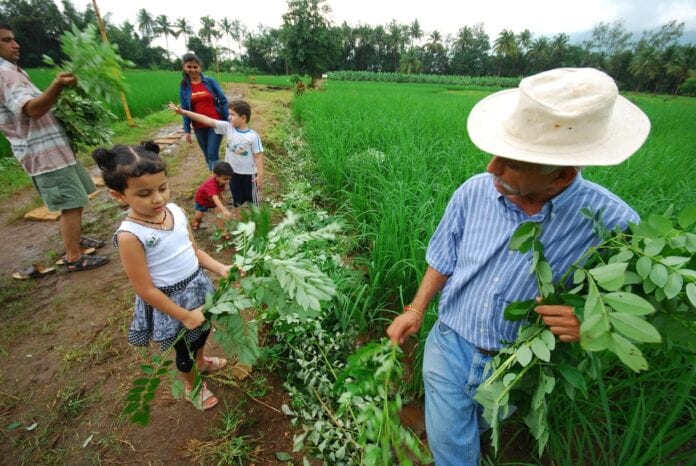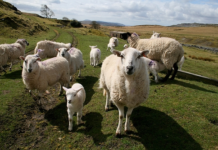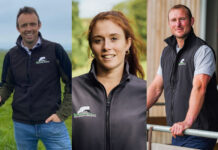The recent Oxford Farming Conference Bitesize webinar brought together speakers from across the world to unravel the ‘Paradox of Plenty’, a theme first debated at the 1984 Conference when the idea emerged that countries rich in natural resources, experience less economic growth.
Held on Thursday 1 October, the webinar was chaired by Sarah Mukherjee, OFC Director and Chief Executive of IEMA; Sarah set the scene reflecting on why farmers appear to be making very little money from the goods and services they produce.
“Why is it that we can spend a ‘fiver’ for a coffee in London, but the dairy farmer and coffee farmer that make up the essential part of that coffee are struggling to pay the rent?”
Tasked with helping the audience find the answers to these questions, by drawing on their wealth of international knowledge and experience, were speakers: Chandrashekhar Bhadsavle, a farmer in India; Daniel McGahey, Senior Environmental and Social Scientist at Earth Systems; and, Konrad Brits, Chief Executive at Falcon Coffees Limited.
Chandrashekhar, a farmer from India, is passionate about helping local farmers – where an enterprise can be as small as one acre – employ regenerative agricultural techniques to improve soil health.
“This paradox implies that the bumper crop harvest by the farmer brings less profit. But, in our modern situation, there are other negative issues attached to the objective of harvesting plenty, with bumper profits. They are unhealthy soil, problematic environment, and unhappy farmers.
“The land and the soil, were most of our food is produced, has started dying. This death of soil is due to over exploitation and greed to produce plenty. We can reverse this, through no-till, regenerative agriculture,” said Chandrashekar.
Chandrashekhar is also aware of the role that agri-tourism can play to not only draw in more young people into the industry but re-instate dignity to farmers.
“Young people are not interested in coming into this industry. They’re losing interest because it’s monotonous, it’s less remunerative and, most importantly, there is no dignity in doing this work. Agritourism is important to fix this with farmers sharing their knowledge and feeling a sense of pride in their work.”
Konrad Brits, Founder and Chief Executive at Falcon Coffees, echoed Chandrashekar’s sentiments on dignity, but noted there is a behavioural change needed within the supply chain to meet the real costs of ethical and sustainable farming.
“Across the world, agricultural supply chains tend to have a common structure.
“They have the same process where they start with farmer who makes the goods and move through the supply chain before they get to the consumer.
“What makes coffee supply chains both interesting and relevant is that they seem to contain all the possible risks and disfunction that exists in food and agricultural supply chains which is amplified because of where they are.”
About 70% of the world’s coffee is produced by an estimated 12 to 15 million small coffee producers.
“These coffee farmers are almost invisible and are all vulnerable through poverty and food insecurity. They also lack access to market, working capital finance, land title and inputs.”
Coffee, much like many staple food crops such as wheat, rice, corn, and soya beans, are traded against Futures Exchanges which are vulnerable to speculation.
“Market speculation causes prices to yoyo in coffee creating a grindingly difficult situation for farmers. This doesn’t hold much dignity for farmers.
“When I look at a supply chain, really the two most important participants bookend it. The farmer, that actually grows the product and the consumer that is buying these fractional units of the finished product.
“Those fractional spends generate the revenue that gets unravelled and has to move its way back and pay for every single person and process, including the farmer. Through commoditisation, there is a de-humanisation in this connection between farmers and consumers, and our individual actions can feel quite powerless to effect change throughout the supply chain.
“The problem is not the structure of the supply chain, but it’s the behavioural culture we have within it. The short term buy-low sell-high cycle within the supply chain is quite predatory, and in the longer term it feels quite destructive.”
Daniel McGahey, Senior Environmental and Social Scientist at Earth Systems, gave attendees an insight into the regenerative agricultural systems in Sub-Saharan Africa and the emerging trade opportunities.
“I think drylands are key when looking to understanding Sub-Saharan Africa’s vulnerability within the food system and some of the pathways that we could help the continent navigate the challenges faced like climate change, market, and integration into global markets.
“Pastoral livestock farming and agroforestry systems in Africa have been in existence for over 5000 years and has generated some of the most bio-diverse landscapes on the planet. These systems are uniquely adapted, they know what they are doing. They are multi-product; they are not set on one system and the operations farmers deploy are very opportunistic.
“We have the free trade agreement in Africa now, and there is an insatiable demand for processed food on the continent presenting an opportunity for entrepreneurs. There is hope in Africa.”
The series of webinars run during the pandemic have focused on themes from the OFC’s 75-year history.
The next #OFCBitesize Webinar will debate ‘Farmers in Competition’, Thursday 1 October 12.00 – 13.00, welcoming guest speakers Minette Batters, President of the National Farmers’ Union and Tony Abbott, former Prime Minister of Australia and appointed adviser to the UK Board of Trade. Those wishing to register can do so here.
Help keep news FREE for our readers
Supporting your local community newspaper/online news outlet is crucial now more than ever. If you believe in independent journalism, then consider making a valuable contribution by making a one-time or monthly donation. We operate in rural areas where providing unbiased news can be challenging. Read More About Supporting The West Wales Chronicle
























